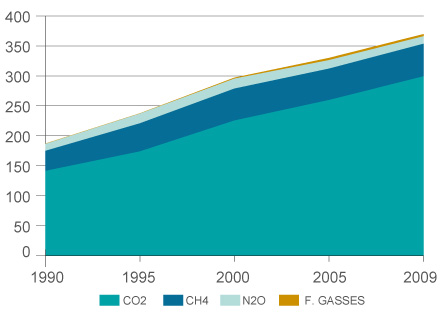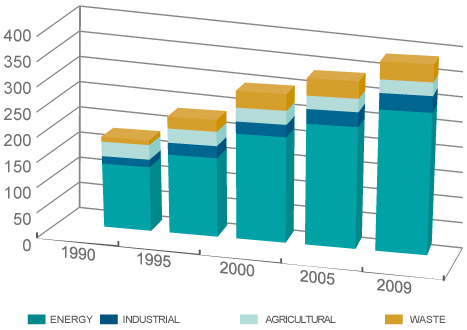WHAT HAPPENS IN TURKEY?
In the 4th Assessment Report of IPCC, Mediterranean Basin's temperature is estimated to rise by 1-2 ˚C and it is indicated that large areas will feel drought and heat waves and days with extreme hot weather will be more frequent within inland areas. Annual average temperature in Turkey is estimated to rise by 2,5-4 °C and the rise will be over 4 °C in Aegean and East Anatolia, in the inner areas this rise is expected to be over 5 °C. A series of national and international scientific model studies conducted in Turkey as well as the IPCC report indicates that in the near future Turkey will have a warmer, drier and uncertain climate in terms of rainfalls.
Turkey would most probably be affected by the negative impacts of climate change such as reduction of water resources, forest fires, drought and desertification and ecological degragation due to previously mentioned changes.
According to the "Greenhouse Gas Emissions Inventory" published in June 2011 by Turkish Statistics Institute, the total greenhouse gas emissions reached 369,6 million tones, 299.1 million tones of which is CO2. Turkey with one of the fastest growing CO2 emissions per capita almost reached world average. According to the same CO2 inventory 2009 total CO2 eq emissions increased by 97,4% compared to 1990 level.
Total GHGs (million ton CO2eq.)

According to the sectoral distribution of Greenhouse gases, energy industry is the leading CO2 emitter with 75 % share in 2009. It is followed by industry, waste and agriculture.
As the 17th biggest economy of the world Turkey ranked 31st carbon dioxide emitter among 178 countries according to IMF data.
Although emissions per capita is not very high, emissions per unit of energy consumptions is close to top-ranked Belgium (2,32 tCO2eq/ton). When you look at the number it is clear how inefficient the value creation and energy transformation in Turkey is. In fact, with 0,71 kg CO2/1000 $ carbon intensity (0,32 according to purchasing power parity) is slightly better than former Eastern European countries who have the burden of large inefficient industries.
GHGs by Sector(million ton CO2eq.)

Turkey, with its rich renewable energy resources and energy efficiency potential, has the chance to be one of the leading countries in the transition to a low carbon economy.
Participating governments of the environmental conference organized by United Nations in Japan in 1997, accepted the Kyoto Protocol which envisaged that the developed countries should decrease their greenhouse gas emissions by 5.2 % between 2008-2012. Turkey who did not sign the Protocol for a long time has been a party of United Nations Framework Convention on Climate Change since 2004, signed the Protocol in August 2009. Turkey who has been the 178th party of the Protocol does not have any obligations for greenhouse gas emission reduction for the first period.
Turkey who is a party to the Kyoto Protocol since August 2009 is among the fastest growing greenhouse gas emitters in the world. To be a part of the solution on this important problem which is threatening future generations, “Climate Change Strategy 2010-2020” was published in May 2010 and short, medium and long term national and industrial strategies were determined. In August 2011 National Climate Change Action Plan 2011-2023 was published by the Ministry of Environment and Urban Development.

Source: Climate Change Action Plan 2012-2023




